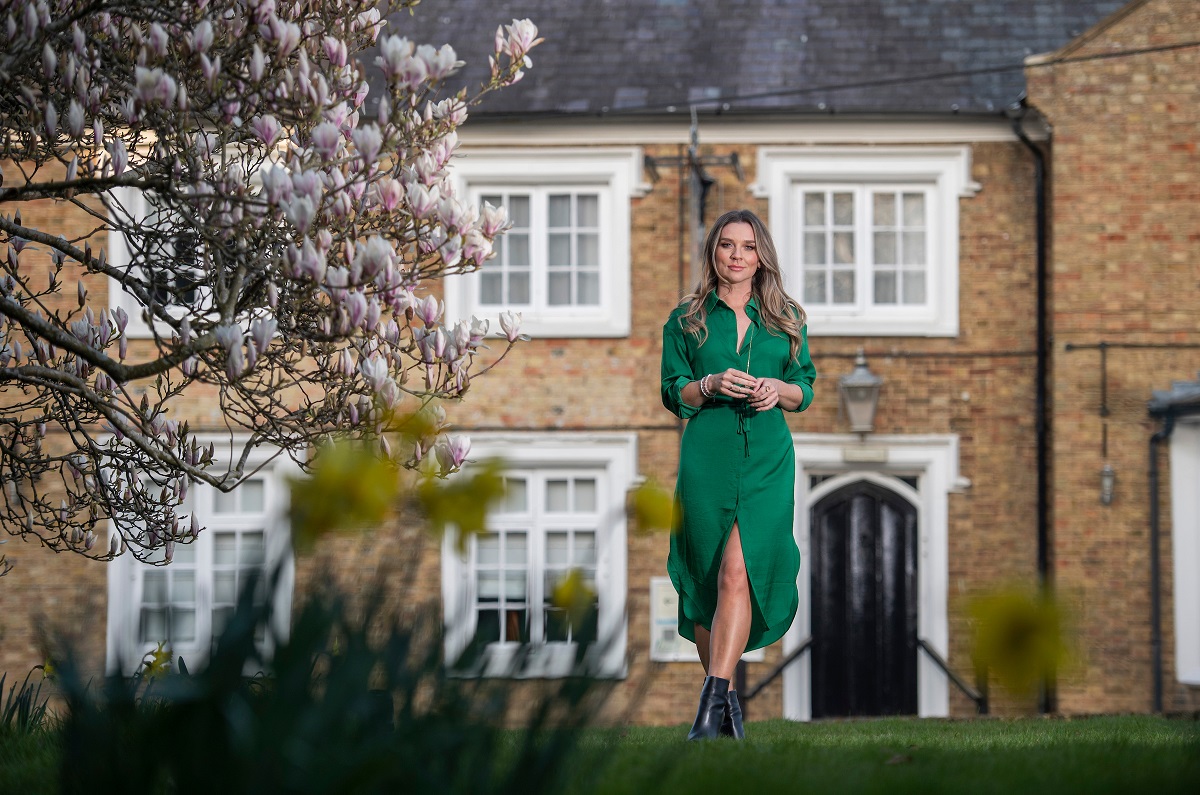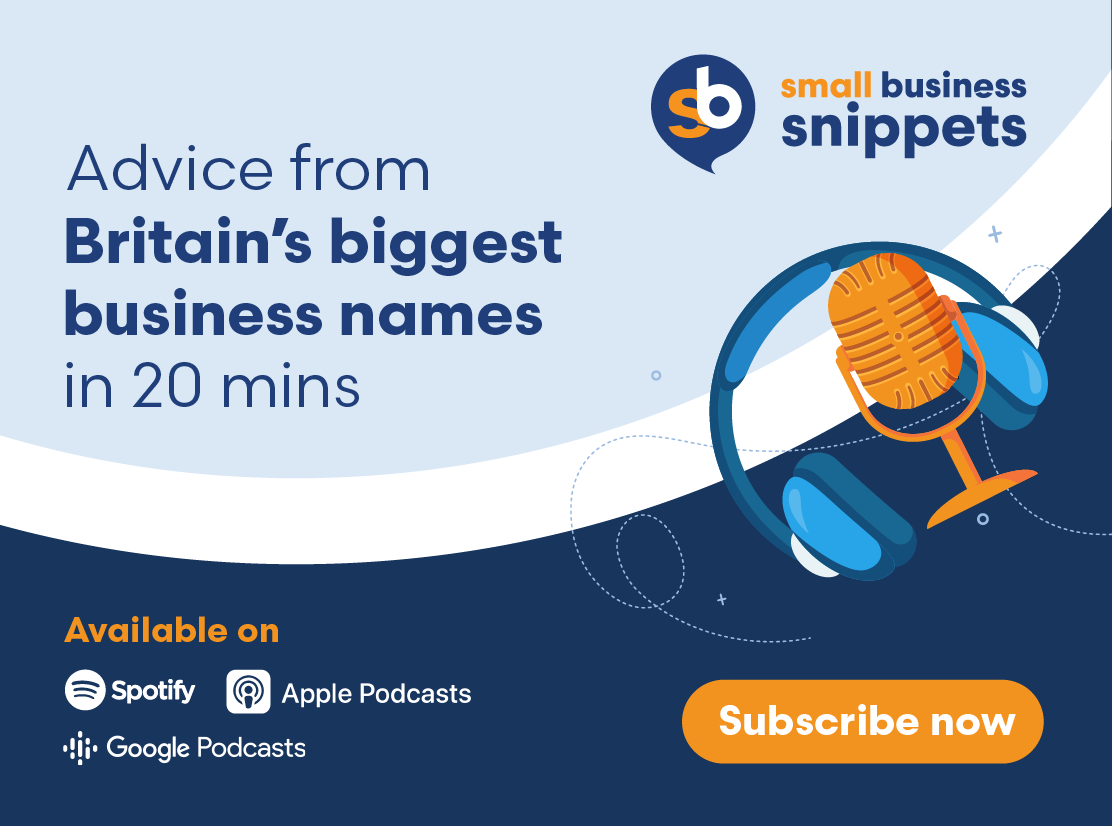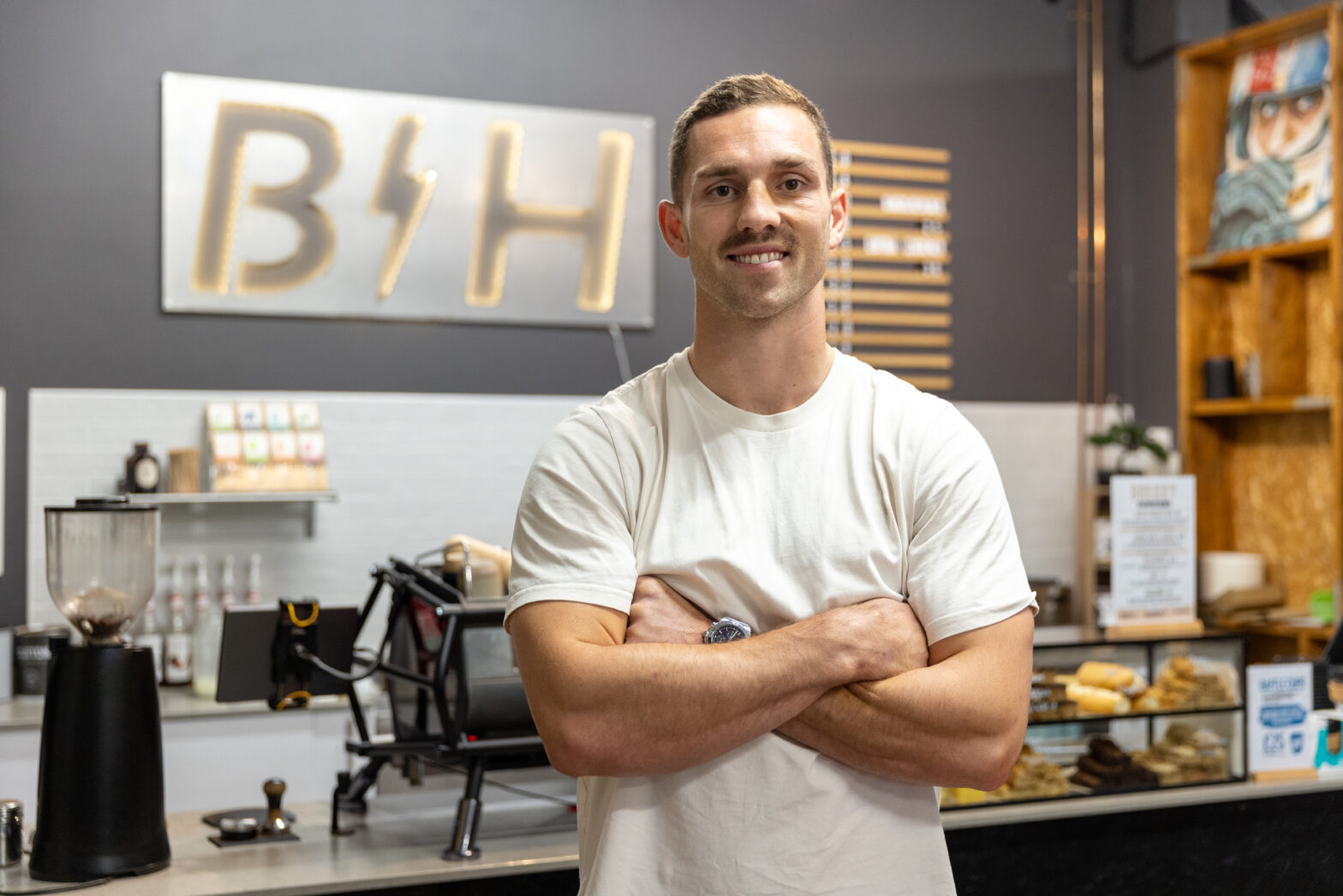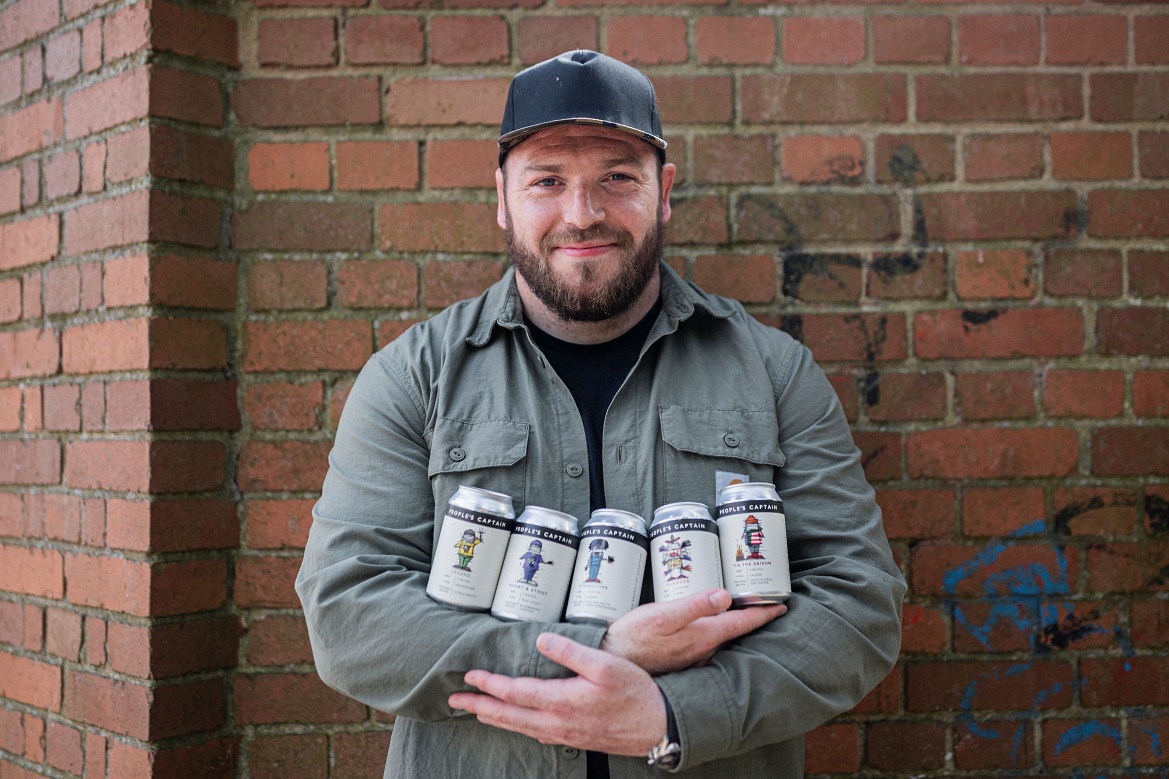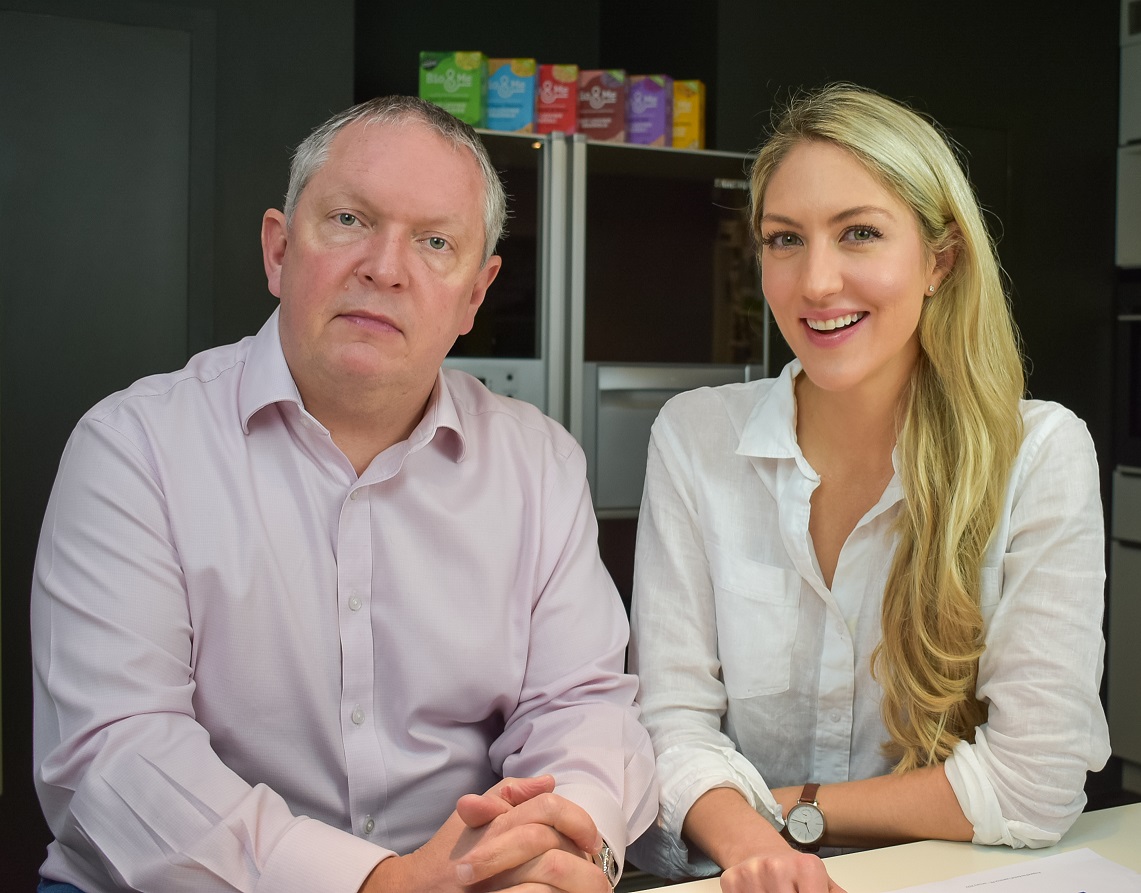Welcome to Small Business Snippets, the podcast from SmallBusiness.co.uk. Today’s guest is Candice Brown business owner, chef, media personality and winner of The Great British Bake Off 2016.
We discuss running a business with attention deficit hyperactivity disorder (ADHD) and handling Making Tax Digital.
This episode is brought to you in association with Xero.
Listen to it in the media player below.
You can watch a couple of teaser videos below.
You can also catch our episodes with:
- Entrepreneur and former athlete, Sally Gunnell
- Entrepreneur and The Apprentice winner, Sian Gabbidon
- Abel & Cole founder and chairman of Freddie’s Flowers, Keith Abel
- Entrepreneur and The Apprentice 2019 winner, Carina Lepore
- Dragon Tej Lalvani and entrepreneur Sam Jones
- Angel investor, entrepreneur and TV personality, Spencer Matthews
- Entrepreneur and former Dragon on Dragon’s Den Ireland, Lady Chanelle McCoy
- Businessman and The Apprentice winner, Mark Wright
- Entrepreneur and campaigner, Paul Lindley
- Managing director of Brompton Bikes, Will Butler-Adams
- Businessman and author, Gerald Ratner
- Entrepreneur and TV presenter, Trinny Woodall
- Pub owner and bartender on Channel 4’s First Dates, Merlin Griffiths
- Founder and chairman of Pimlico (formerly Pimlico Plumbers), Charlie Mullins
- Retail expert and former Dragon, Theo Paphitis
- Author and boardroom expert, John Tusa
- Digital guru and investor, Sherry Coutu
- Entrepreneur and former Dragon, Rachel Elnaugh
- Businesswoman and Dragon, Deborah Meaden
- Entrepreneur and The Apprentice 2005 candidate, Tim Campbell
- Gousto CEO, Timo Boldt
- Entrepreneur and The Apprentice 2018 candidate, Jackie Fast
- Investor and former Dragon, Piers Linney
- Investment fund manager, Nicola Horlick
- Supermodel turned entrepreneur, Caprice
We’ve got podcast episodes from the first series looking at:
- How one business owner’s mental breakdown caused her to see trolls from her past
- How one entrepreneur hired a videographer to track their every move and build their business brand
- How funding a business led one entrepreneur to stress-related alopecia
- One entrepreneur’s first professional public speaking engagement
- Adapting to UK life and learning English before starting a business
- Securing seed funding
- Finding the perfect head of customer care
- Reaching a £1 million annual rate of return
- Boosting client numbers from 30 to 850
- Starting a brand new business from scratch
To find out more about Small Business Snippets, you can download the trailer.
If you want to listen to the podcast elsewhere, it’s available on Apple Podcasts, Google Podcasts and Spotify. Watch the new video versions and subscribe over at our YouTube channel. It’d also be great if you could leave us a review.
Remember to like us on Facebook @SmallBusinessExperts and follow us on Twitter @smallbusinessuk, all lower case.
Candice Brown podcast transcript
Hello and welcome to Small Business Snippets, the podcast from SmallBusiness.co.uk. I’m your host, Anna Jordan.
Today we have Candice Brown – pub owner, chef, media personality and winner of the Great British Bake Off in 2016.
After winning the show, she gave up her job as a secondary school special needs teacher to pursue baking full-time. She’s released two cookbooks, Comfortand Happy Cooking, and runs The Green Man pub in Eversholt with her brother, Ben.
The pub took a hard hit over the pandemic, with only £416 in their business bank account and Candice in the kitchen making meals for delivery single-handedly.
The business is recovering, and she’s teamed up with Xero to demystify Making Tax Digital.
We’re going to be talking about running a business with attention deficit hyperactivity disorder (ADHD) along with getting involved with causes that you believe in.
Anna: Hi, Candice.
Candice: Hi. How are you?
Anna: Yeah, I’m doing really well, thanks. How are you doing?
Candice: Yeah, good. Thank you busy, busy and all over the place, but really, really well.
There is a two-pronged approach to your day-to-day: there’s the pub owner and there’s the media personality side of things. How do the two work together?
Candice: It’s funny – when people sort of say about like media personality and fame and things like that. It makes me feel funny, because I don’t class myself as that. This is just something I’ve done, I’ve been able to turn a hobby into a job, which is just incredible. Obviously going on the show [The Great British Bake Off] when it was at its biggest – it was the last one at the BBC before the big change over Channel 4. It got huge amounts of views. So obviously, the media interest was there. But I didn’t know what to expect. I never knew what was going on. I didn’t assume anything. So, everything has just been an incredible surprise.
I’ve taken opportunities and given them my all and run with them and really try to try to do things that I can really get behind, that I feel completely passionate about. The pub is one of those – I always wanted something. I suppose, in a way, Bake Off slowed that down, but then sped it up when it came along. It was never going to be a pub, which is interesting, but we just saw the place and fell in love with it. Also, I wasn’t silly enough and I’m not silly enough to think that the media things and everything like that will last forever. I knew I needed a business to fall back on and to have something running alongside and to build and to really kind of develop. That’s where the pub came in.
So, the two definitely overlap. It’s a funny overlap – I definitely see myself as a landlady and weirdly, a business owner now, which is something I never thought I would do. But kind of all the other stuff allows me to build this business, which is just an incredible situation to be in.
What kind of role do you play in the day-to-day on the pub side of things?
Candice: I’m laughing because I do a bit of everything, I literally do everything. And that might be from cleaning if the cleaners don’t turn up, it might be serving, waiting tables, behind the bar, helping out in the kitchen. I bake, so we have cakes of the day and the puddings and things. Obviously, fully involved in recipe and menu development and things like that, along with the head chef and the kitchen team, who are just incredible. I pretty much do everything and anything. I wouldn’t do anything that I wouldn’t expect anybody else to do. I live above the pub as well, so obviously I’m here when I’m here. I’m here all the time. I’m pretty hands-on. I’m hands, feet, head-on – everything. I’m fully, fully in.
That’s the best approach to take as a business owner. I also understand that in January 2020, you were diagnosed with ADHD. Forbes has described this as a ‘superpower’ for an entrepreneur. How do you feel about this statement as a business owner?
Candice: I’ve kind of always exceeded and excelled in physical subjects at school. I think having taught special needs and understanding a little bit I kind of probably knew I probably had something along the lines of ADHD. But it’s diagnosed so late on in women and it’s diagnosed so differently in girls as well. It shows itself so differently – as we’re all individuals – it presents itself so differently.
I knew, working in schools, children are almost the grey. They’re not misbehaving. They’re not falling below. They’re not excelling. They’re not exceeding expectations. They’re just coasting along the middle and they’re doing fine. They’re causing no real problems. They’re just doing okay. That’s what I was and that’s what I did. I loved P.E., I loved food technology, woodwork, drama. Everything like that, I was top. Things like maths I just completely struggled, in history, just could not remember a thing. I mean, I don’t think I even got a registered mark on my history GCSE because I couldn’t remember. It’s things like that. I’d go into school wearing odd shoes at the age of 16. I was late every day – Mum used to leave me at home and take my brother in because I’ve made my brother late.
All of these things, it’s just like, ‘It’s just Candice and she’s a bumblebee’. It’s carried on through life. People tell me to meet them an hour earlier than I should be because I’m late all the time. I started seeing a psychiatrist and I’ve been quite open about my mental health. It was one of the things he said, ‘I would like to address this.’ I said, ‘Address what?’ He said, ‘I want to run a few tests.’ It wasn’t what I was there to talk about. But it kind of made sense. It has, and [ADHD] did enable me to do Bake Off. Give me a week to do something. I will take that week, and probably take two weeks and probably still do it in the last hour of that two weeks, even though it was due a week ago. People were saying, ‘How did you do Bake Off?’ I had three and a half hours to get this done. If I didn’t get it done, I was going to look really stupid, so I had to get it done. There was no choice. That’s how I did it. I would thrive under pressure. It’s the only time I can get stuff done – within a time limit. I mean, you asked my brother I drive him mad, absolutely mad, because he’s like, ‘Do things, do it now, get it done.’ I’m like, ‘Yeah, yeah, yeah – I was just doing it.’ Then I wander off and go and do something else. But it has enabled me to do the things that I have done. It’s enabled me to proceed to progress and to learn, but in quite a different way and adapting. I’m still learning about ADHD. I’m still learning about myself, which is really interesting for the teacher side of me as well.
But I think, as a superpower? Yeah, I suppose it is for some people. I suppose yeah, it enabled me to do Bake Off, which actually, I don’t know, had I been kind of less thinking about it or thought about it too much, maybe I wouldn’t have done it. But the fact I was like, ‘Right, you know what? I’ve got to get this done. I’ve got no choice. Get it done and do it.’ I over-planned, I wanted to do more. Everything I did they didn’t think I was going to get done in the time limit. But that’s how I do things now as well. I try and squeeze as much as I can into the day. Sometimes it works, sometimes it doesn’t, but it can also be quite stressful. But yeah, it’s about learning and managing that.
I think it’s an interesting thing, an entrepreneurial superpower. I mean, I’m quite happy to have that tagline. Might get myself a little cape or something like that. But yeah, it works.
Me and my brother work well together. He’s very straight-down-the-line. He knows numbers. He’s a builder. He knows figures and things like that. Whereas I’d go, ‘I don’t, I can’t Ben, I don’t understand. I don’t need to know.’ But it’s about having that trust and I will say having people around like accountants and things like that, that we do trust because that’s where I fall short. I use my superpowers and my strength to push on. Also, I recognise my weaknesses and I use people I can trust for those weaknesses and learn.
That kind of brings us nicely into one of one of the areas where it sounds like you do struggle a bit, which is the bookkeeping side of things. Of course, with all the problems we’ve had over the past couple of years, there has been the looming spectre of the rollout of Making Tax Digital as well.
Candice: I mean, I will be the first person to say that terrified me straightaway. I was like, ‘How am I going to do this?’ I don’t have real interest in using IT and computers, then the thought of putting tax and numbers alongside IT and computers, was just very, very daunting. I know it is for a lot of people, but it’s so crucial for small businesses today, it’s so crucial and it’s going to be going to become a law. So, we have to do it, there are no ifs and buts about it, we have to be able to do it.
Making it as simple as possible and having a team around us that we trust and know what they’re doing that you can fall back on. It’s so, so important because it is daunting, but as small businesses, we’re going to have to do it. There are no ifs and buts about it. It’s one of those things, it’s got to be done. Same as I approach everything, right? It’s got to be done. But how can I do this in the easiest and best way for me and for my business?
If you don’t have the people or the resources, is there anything else you can rely on to help deal with those bookkeeping tasks?
If you haven’t got that around you, then obviously, packages like Xero are offering a really simple, easy way to do it. And when I went on and had a look at what they were doing, my first thought was, ‘Oh, I could do that.’ And that’s a real benchmark for me. If I can do it, then you can do it, especially when it comes to numbers and maths and things I don’t really have an interest in, so I’m going to lose my attention, I’m probably going to lose my thought process to actually simple effective programmes and an apps like Xero are going to be so beneficial to people, they really, really are, because it’s making something quite daunting, really, really simple and pretty easy and less daunting, because it has to be done.
You’ve got involved in a lot of the other struggles that pubs and other hospitality businesses have experienced too. Everything from reducing beer duty, tackling food waste, tackling no shows, you’ve got involved in quite a lot of causes. For a small business owner who is cash-strapped and potentially time-strapped, how can they get involved in activism and causes?
Candice: I think this is a funny one because when he said about activism, oh gosh, is that like full-on, like, placards and demonstrations and stuff like that? I do follow a lot of charities and I’m one of these people that feels like I’m never doing enough.
If we are struggling, then there can be other people struggling and other people who are struggling more and in different ways. I do lots of bits and pieces for charities. I work with different charities, whether it’s dogs on the streets, Alzheimer’s research Coppafeel. I try and do my bit, but then obviously there’s ones that hit closer to home like campaigning for the reduction in beer tax, because that affected me directly and I know it’s affecting my peers and my colleagues directly who have pubs or are in hospitality. To be to be asked to help or to ask to have a voice about that and use my platform is incredible and really important. Again, daunting, but also using my knowledge and a lot of the time the things I do and what I do it either affects me or it’s something I completely and utterly passionately believe in which means I can give it my all, it means I can get behind it and obviously it’s the same thing as working alongside Xero, that tax going digital is happening.
If I am struggling and I’m worried about that change, then I know other people will be as well. So, it’s so important because obviously, it’s making smaller businesses aware of the legislation and using the benefits that technology can bring. Because actually, we use it so much that there’s other campaigns and things I do, whether it’s working with animal shelters, whether it’s working with Alzheimer’s research, whether it’s a trek I’m doing, people have found those out through technology and social media.
If you’re able to do those things, and able to share knowledge about things like tax going digital, then that’s a good thing, because it does all kind of work through tax goes up on beer, your taxes go up, you need to go to your accountant. That’s what I find weird. Finally, how everything almost comes together in a really weird mush-up circle. It’s just about picking those bits apart, using your strengths, picking the brains of other people’s strengths and learning and having people that you can trust. I think if you believe in something, I think it’s so important to have a voice. As long as you’re not harming anybody else and as long as you’re not being mean or unkind. I think it’s important to have a voice to tell people what you believe in.
I think that’s where it’s just so important to work with, to do what you believe in and share your passion, because you learn from that. But you also can help other people learn as well. Things do happen that you that aren’t right, things do happen that will be of detriment to you. I think you need to ensure that if you believe something is right or something is wrong, you go about it in the right way to try and make a difference. Because we are here, we are trying to do what we’re doing. We’re trying to survive in quite a difficult time. I think if we can make things easy for ourselves or speak up for people that maybe don’t have a voice or causes or activism, then I think it’s it can only be a good thing and sharing through technologies is probably the biggest way that that’s going to happen now.
Absolutely – and sharing your voice and using technology have been central to a very quickly changing landscape over the past couple of years. What kind of advice would you give to other hospitality owners about adapting to a new normal?
Candice: Ahhh, new normal!
Anna: I know, I had to!
Candice: People say normal. Really, you know what? There is no normal. That’s everything that’s through what is normal? Oh, God, I’m not normal. Was that because I’ve got ADHD is that because I’m just different to the next person? Of course, it’s we’re all different.
Actually, being perfectly imperfect is a great thing. But that’s across the board. And I think that’s what the pandemic has maybe shown us as well, and probably even more is that we are all different. What we thought was normal was never really normal. Now it’s completely upside-down, back-to-front diagonal and wiggly all over the place. We have had to adapt that. I think hospitality, we’re probably affected some of the worst.
But I think it showed the resilience of the hospitality sector, that people did come together, and people did do what was right – we can’t be open, let’s do takeaways. We can’t talk to customers, let’s get online. Schools can’t provide free school meals. Let’s do that. It was very, very powerful. I think using that is just incredible. I think we we’re still trying to recoup what we’ve lost. I think a lot of businesses will be doing that as well.
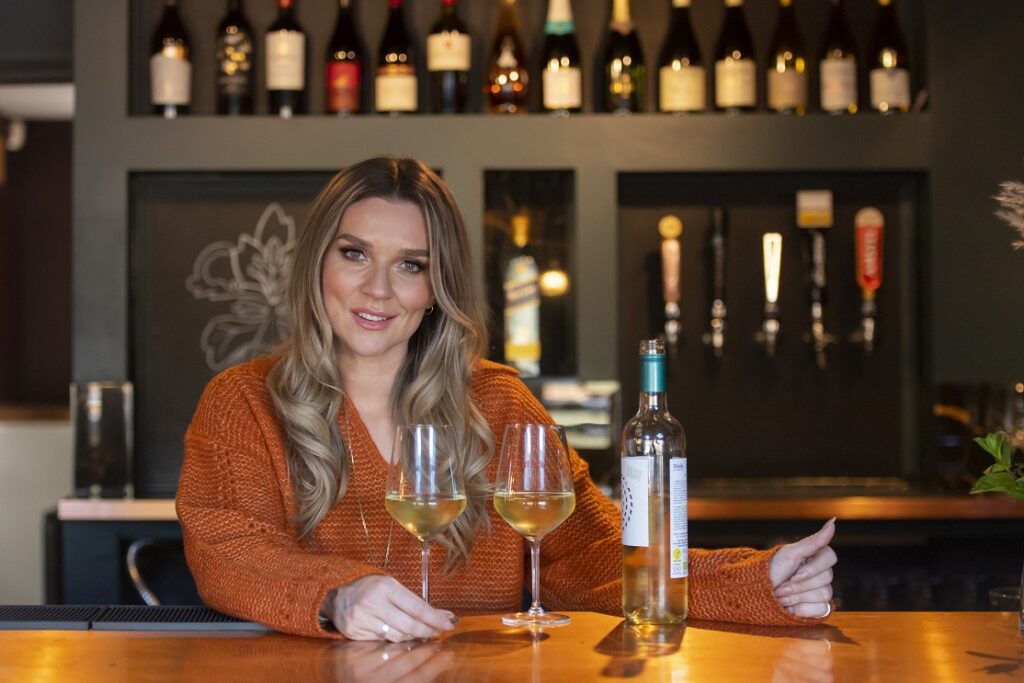
I feel that every day we’re so short-staffed it’s untrue, hence the cleaning, hence having to do work in the pub, hence having to do all those different bits and pieces. Not saying that I wouldn’t anyway because I am here, but it shows. There are so many things that obviously, as an individual I can do, as a business with my brother and The Green Man we can do to bounce back and to get on our feet. A lot of that does come down to planning, having an incredible team, working with a team that we trust, having people that we can fall back on for advice, whether it’s people from accounting, whether it’s tax advice, whether it’s building advice. I’m lucky that my brother, Ben, and my dad, are builders. So if we can kind of use that. So again, but using those strengths to kind of benefit you.
Again, just asking questions, we were quiet in the weeks, we look at what we do for the menu, we change our menu for it to be seasonal and adaptable. Obviously, vegan food is huge at the moment. So, we offer vegan things, which actually a couple of years ago, that’s not really something that probably crossed my mind so much. Make sure there are things for the children to do, making sure the outside area is good. Communicating with customers, knowing where you are based. For us, we’re in the middle of a tiny little village, very little footfall. So, there’d be absolutely no point doing an offer for anyone walking past to pick up a sandwich in blah, blah, and just having a placard outside because people aren’t going to see that. But if we wanted to do that, we could go online, use technology to go right, okay, drive past, pick up a pie, take it away, or pick up a sausage roll, drop in for this. Use your strengths and know your environment. If you have a pub or a cafe that’s on the side of a really busy market town and then get things outside, get music playing and things like that.
We’re never going to be able to throw a rave or a dance or anything like that at the pub because I think the locals would go absolutely mental. But somewhere with a busy town with a lower age customer base, then that might work brilliantly. But also try things. If they don’t work, it’s not the end of the world. Mistakes happen and you learn from them. I think that’s so important. But we do have to adapt, we’re going to have to keep adapting, we literally take every day, every week as it comes. If something doesn’t work, we go, ‘Right, draw a line under it,’ and we move on. Because otherwise, that’s where the danger is. The saying ‘don’t flog a dead horse.’ If it’s done, and it’s not working, don’t be ashamed to go you know what hands up, that didn’t work. Let’s try something different. Because I think sometimes the pressures of, ‘It’s got to be perfect.’ It’s got to work. This is normal. Let’s do that.
I think the last few years have shown us actually, no, we’re rewriting the rulebook a little bit. I think it’s being brave understanding and trying to trying to come to terms with the facts, things do change, things are different. And you know what, that’s okay. But just have a great team that you can trust. Embrace technology, no matter how daunting it might be, ask someone about it, because it is so beneficial in more ways than one. Legally, but also for business.
Would you mind saying a few words about for any listeners that might feel they might have ADHD and they’re not sure? What kind of advice would you give them, such as signs and what to do next?
Candice: I’m definitely not a medical expert or anything like that. I can only go on what I know for myself, but I think if anyone maybe thinks or is showing maybe signs or is just wondering sort of about themselves, then maybe speak to somebody. I know that the NHS and people are quite overrun at the moment. It’s very, very difficult. I think patience and talking to people and actually probably talking to people who are close to you as well and just explain that you are maybe struggling with a few things. Just be patient with me while I look into this a little bit more. Obviously, seek out an expert or find out someone that has been recommended.
But also, again, if you’re in school or you have children or nieces, nephews, anything like that they’re in school and you think speak to the school about it. Schools just do incredible jobs. A hard, tough job. It breaks my heart that good teachers are leaving the profession but speak to them because they do care. In their the fountain of knowledge and they will point you in the right direction.
But I think the key is communication. And if time is a problem and there’s waiting lists and things like that for the NHS, which unfortunately there isn’t they’re doing such incredible but such a tough job then just start communicating with people. Do your research, ask questions and just have patience as well. Just learn to know what works for you. We are all individual, whether it’s ADHD, ADD, dyslexia, dyspraxia, anything like that, you may have physical impairments, anything, we’re all individual and that is incredible. And that’s what makes us, us. We learn to do things our way. I think that is enough. I think that’s such a powerful thing to be able to do things our very own way. But yeah, just communication is so key – communication, learning and research. Never stop learning in any way, shape or form.
Anna: Well, I have nothing I could possibly add to that as very well said.
Candice: You can tell I used to be a teacher!
Anna: Yeah! Well, that seems like a great place to wrap up. So thank you for coming on the podcast, Candice. It’s been great.
Candice: Thank you so much for having me. I really, really enjoyed that.
You can find out more about Candice by searching @candicebrown on Instagram. You can also visit SmallBusiness.co.uk to learn about Making Tax Digital. Remember to like us on Facebook @SmallBusinessExperts, on Twitter @smallbusinessuk (all lowercase) and subscribe to our YouTube channel, linked in the description. Until next time, thank you for listening.
